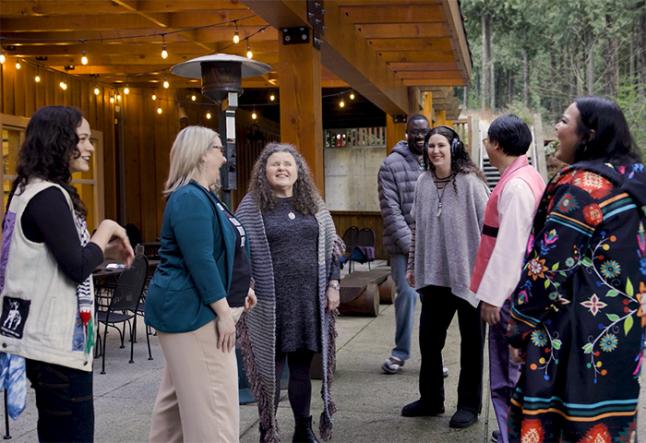A Church with the Boldness to Evolve
“We are in this time of deep transformation. For me it's a blessing when we’re not comfortable, when we are expelled from our comfort zone. These are the times where we are the most creative and resourceful. What will the new United Church be in 100 years? I don't know.”
Stéphane reveres The United Church of Canada's courage to confront difficult questions, seeing its strength in embracing controversy for the sake of justice. He remembers 1988, when the church voted to affirm “that all people regardless of sexual orientation are welcome as full members of the United Church, and all members are eligible to be considered for ordered ministry,” fully aware that this would cause some members to leave. “We will lose people because of this,” he recalls, “and then the church said, maybe, but this is the right thing to do, so let’s do it.” For him, that decision wasn’t just about inclusion—it was about integrity, creating a space where everyone could belong, regardless of their identity.
Stéphane believes the power of diversity shapes a meaningful community. “The United Church has always been a place where people can come, where you’re not going to be judged and you won’t be expected to follow all the rules and check all the boxes to belong,” he says. “No, come as you are. No restriction applied here.”
Stéphane acknowledges the boldness required to engage with difficult truths. “The United Church is ready to live with not just one theology, but fifty theologies at the same time… that was an attractive part about joining the United Church. It was not my way or the highway. There was room to talk. It wasn’t yes or no. It can be annoying that there’s no clear answers, but it leaves space for true diversity to happen.”
Reflecting on “A Place at the Table” as a theme, Stéphane points out that, throughout the gospels, Jesus is often found around a table. He notes that those who gathered with Jesus included both prominent figures of the time and individuals marginalized by society—such as prostitutes and lepers. Even on his final night, Jesus chose to share a meal with his friends, a moment that continues to be remembered each time Communion is celebrated. For Stéphane, the sacredness of the table is not limited to the bread and the cup; rather, it lies in the holy moment where all are invited to explore the depth of Christ’s radical love and open invitation. He believes that this gathering calls us into deeper relationship with God and with one another. When Jesus invites us to the table, Stéphane affirms, it is a powerful reminder that everyone belongs and is worthy of love.
Stéphane sees the church’s power in its boldness, inclusivity, and reflection, believing these qualities will continue to create something relevant and life-giving in an ever-changing world. For him, confronting the hard truths of social justice, the church’s history, and the changing nature of faith allows the church—and “A Place at the Table”—to evolve.
“The United Church of Canada quite clearly has the capacity to lay down pathways, especially in Canada,” he says. “‘A Place at the Table’ is quite clearly a way of continuing that journey.”

Le pasteur Stéphane Vermette works as the French Outreach Coordinator for The United Church of Canada. Born in Québec, he joined the United Church in his early twenties. He was ordained a minister in 2006 and has served several congregations (both in English and French) in Ontario and online. Since the 2010s, he has been exploring ways to do ministry on various digital platforms. His biblical centre of liberal theology is inspired by the works of John Dominic Crossan. He has served on many national committees of the church over the past two decades.
More from A Place at the Table
For media inquiries, please contact:
Halli Gallo
Halli.Gallo@mediaprofile.com
Consultant, Media Profile
647-654-1550


